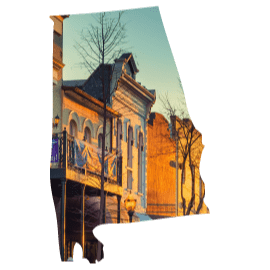Secondary Teacher Preparation in Science:
Alabama
Delivering Well Prepared Teachers Policy
Analysis of Alabama's policies
Secondary science teachers in Alabama have the option of a comprehensive teaching license with a specialization in general science. These candidates must take a minimum of one course in each of the specified areas included in the comprehensive teaching field—namely biology, chemistry, physics, and earth and space science—and they are required to pass the Praxis II "General Science" content test. Teachers with this license are not limited to teaching general science but rather can teach any of the topical areas.
Middle school science teachers have two options: either a comprehensive teaching license with a specialization in general science or one in a single teaching field. Commendably, candidates are also required to pass the Praxis II "Middle School Science" test.
Recommendations for Alabama
Require secondary science teachers to pass tests of content knowledge for each science discipline they intend to teach.
States that allow general science certifications—and only require a general knowledge science exam—are not ensuring that these secondary teachers possess adequate subject-specific content knowledge. Alabama's required assessment combines all subject areas (e.g., biology, chemistry, physics) and does not report separate scores for each subject area. Therefore, candidates could answer many—perhaps all—chemistry questions, for example, incorrectly yet still be licensed to teach chemistry to high school students.
State response to our analysis
Alabama recognized the factual accuracy of this analysis. The state added that it provides a general science option at both the middle and secondary levels to meet the needs of schools that cannot afford to employ a full-time chemistry or physics teacher who would carry less than a full teaching load. Program completion requires a "pure" arts and sciences-type major in one area of science, which includes at least 32 semester hours of credit with at least 19 semester hours of upper-division credit, in addition to courses in other areas of science needed to document compliance with the general rules for all science teaching fields and the rules specific to general science. Candidates must also pass the Praxis II General Science test.
Alabama also noted that it provides options in the specific disciplines of biology, chemistry and physics and requires a passing score on those subject-specific Praxis II tests. Program-completion requirements are similar to those stated above.
Last word
There is no doubt that districts, especially small and/or rural districts, appreciate the flexibility offered by the general science certificate. The state need not do away with this license but rather change its requirements to ensure that a teacher with such a license has the requisite knowledge and skills to teach all included subjects. There are also other ways to address situations where a full-time teacher might not be needed without sacrificing teacher content knowledge, including distance and blending learning or a part-time adjunct license as described in Goal 2-D.
Select another topic
Delivering Well Prepared Teachers
- Admission into Preparation Programs
- Elementary Teacher Preparation
- Elementary Teacher Preparation in Reading Instruction
- Elementary Teacher Preparation in Mathematics
- Middle School Teacher Preparation
- Secondary Teacher Preparation
- Secondary Teacher Preparation in Science
- Secondary Teacher Preparation in Social Studies
- Special Education Teacher Preparation
- Assessing Professional Knowledge
- Student Teaching
- Teacher Preparation Program Accountability
Expanding the Pool of Teachers
Identifying Effective Teachers
- State Data Systems
- Evaluation of Effectiveness
- Frequency of Evaluations
- Tenure
- Licensure Advancement
- Equitable Distribution

